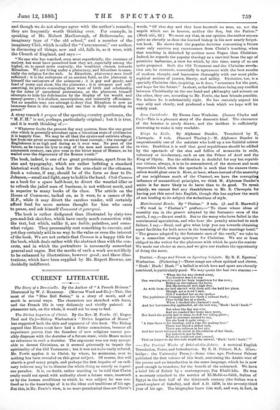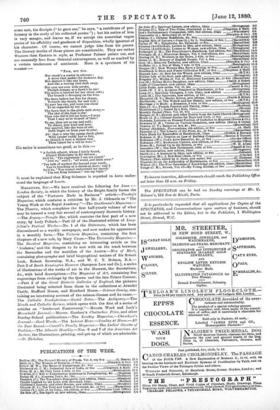POETBY. — Songs and Verses on Sporting Subjects. By R. E. Egerton .
Warburton. (Pickering.)—These songs are often spirited and clever. " Hush ! Hush ! Hush !" a ballad in which love and sport are cleverly combined, is particularly good. We may quote the last two stanzas :— 4. When the fox was viewed away,
Too discreet wan Ito say One warning word to curb her keen impatience for the race ; Biding on throughout the burst, Mid the foremost well nigh first, As with them she had started, with them Ball she held her place.
Though not a word I said, Still I watched her as she sped,— The joyfulness of triumph gave her cheek a radiant flush; Close beside her at a cheek, When I stroked the chestnut's neck, And her horsemanship applauded, all she said was, 'Hush! hash! hush!'
But when the day was o'er, And we reached her home ewe more, Her hand she gently laid in mine, to doff her riding-glove ; And its pressure seemed to say, Ere she took it quite away,-
' A. time there is for hunting, and a time for making love.'
There wee heard a stilled sigh,
There was softness in her eye, And her heart betrayed its secret in the crimson of her blush. Joy indeed it was to feel, What she could not now conceal, That no longer to my love-tale would she answer, Hush! hush ! hush!'"
—The Poetical Works of Behci-ed-din-Zoheir. A metrical English Translation, Notes, and Introduction. By E. H. Palmer, MA. (Cam- bridge : the University Press.)—Some time ago, Professor Palmer published the first volume of this 'work, containing the Arabic text of the poems and an introduction in the same language, which he is now good enough to translate, for the benefit of the unlearned. We have a brief life of Zoheir by a contemporary, Ibn Khalli-lain. He was a secretary attached to the service of El-Molik-es-Salik, Sultan of Egypt in the first half of the thirteenth century (the Sultan was a grand-nephew of Saladin), and died A.D. 1258, in the seventy-third year of his age. The biographer knew him well, and was, in fact, in some sort, his disciple (" he gave me," he says, "a certificate of pro- ficiency in the study of his collected poems ") ; but his notice of him is very meagre, and leaves us, if we accept the somewhat vague praise of his affability and goodness of disposition, wholly ignorant of his character. Of coarse, we cannot judge him from his poems. The literary merits of these pieces are considerable. They are rather Western than Eastern in style, as Professor Palmer points out, and are unusually free from Oriental extravagance, as well as marked by a certain tenderness of sentiment. Here is a specimen of his manner
"FAIR, RUT COT.
Her cheek's a sentry in advance ; A moon that makes the darkness day. Her stature is like any lance, And like a waving reed doth sway. Her eyes are ever wide awake, Though dreamy as a fawn's to see! The moon is blurred for her sweet sake; The branch is drooping on the tree. The fawn before her flies for shame, Towards the desert, far and wide ; No peer has she, and none can claim To be regarded by her side.
The fawn that in the glade doth stray,— The idol of the fans is she Thou who did'at bid me hope,—I pray That I may ne'er despair of thee !
To me, thou art so coy and cold ;
To others, ever kind and near. Our quarrel, like the wars of old,
Both linger on from year to year.
Ah! that is why thy young cheek glows
With yonder ruddy hue so fair, AB though it were a distant rose
Thou takest for a veil to wear."
His satire is sometimes too good, as in this :— '• A foolish atheist, whom I lately found, Alleged Philosophy in his defence ; Said he' 'The arguments I use are sound.' 'Just so," said I; 'all sound, and little sense?
'You talk of matters far beyond your reach, You're knocking at a closed-up door,' said I. Said he, ' You cannot understand my speech.' 'I'm not King Solomon!' was my reply."
It must be explained that King Solomon is reported to have under- stood the language of beasts.



































 Previous page
Previous page